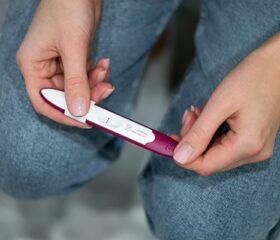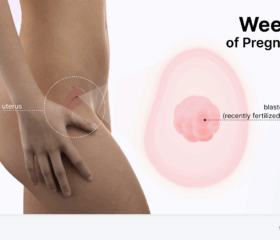Heartburn in Pregnancy: When It Starts, Treatment, and Tips
Whether or not you suffered from heartburn before pregnancy, you may have to contend with it now that you’re expecting.

About 80% of women experience heartburn at some point during pregnancy. 1 While it’s usually a harmless side effect, the burning sensation and discomfort it causes are frustrating, to say the least.
Don’t be dismayed—although it’s tricky to fully prevent heartburn during pregnancy, there are plenty of practical ways to keep it under control.
Let’s look at what causes heartburn during pregnancy, when it often starts, and how you can combat it.
When does heartburn start during pregnancy?
Heartburn and indigestion are some of the most common pregnancy symptoms. They can start as early as the first trimester and may last through your entire pregnancy.
However, you’re more likely to experience heartburn and indigestion in the third trimester when your growing uterus puts more pressure on your stomach. 2 3
What’s the difference between heartburn and indigestion?
While heartburn and indigestion are often used interchangeably, they’re slightly different:
- Heartburn: This refers specifically to a burning sensation in the chest, often rising towards the throat. It’s typically caused by stomach acid flowing back into the esophagus. 4
- Indigestion: This is a broader term that encompasses general discomfort after eating, which can include heartburn, bloating, gas, nausea, and stomach pain. 5
What causes heartburn during pregnancy?
There are three main causes for heartburn during pregnancy:
- Your hormonal levels: As with many pregnancy symptoms, your surging pregnancy hormones are partly to blame for heartburn. They can slow down your digestive tract, making food sit in your stomach longer. Consequently, you may feel bloated during your pregnancy, get heartburn, and even feel nauseous. 2
- Lower esophageal sphincter softening: One particular hormone, progesterone, relaxes your smooth muscles, including your lower esophageal sphincter (LES). Normally, LES prevents stomach acid from backing up into the esophagus; when it relaxes, acid reflux may occur and lead to heartburn. 2
- Your uterus expanding: As alluded to above, your growing baby can cause heartburn in the later stages of pregnancy. As your uterus expands to accommodate her, it will put pressure on your stomach. This can push stomach acid upwards into your esophagus.
You’re more likely to experience heartburn during pregnancy if you’ve had it before
While pregnancy is often the first time many women experience heartburn, you’re more likely to get it if you suffered from it prior to getting pregnant. You’re also more likely to get it if this isn’t your first pregnancy. 6
How can you get immediate relief from heartburn?
When heartburn strikes, it can be debilitating. Fortunately, there are a few ways you can get immediate relief. Try:
- Eating yogurt or drinking milk: Pasteurized milk or yogurt can work as a temporary buffer between your stomach lining and acidic stomach contents, giving you immediate relief from heartburn. Opt for low-fat options, as the fat in milk can actually aggravate heartburn. 7
- Chewing sugar-free gum: Chewing gum stimulates the production of saliva. This helps neutralize stomach acid, soothe your esophagus, and wash acid back down to your stomach. Note that peppermint is a trigger food; stay away from peppermint-flavored gum. 8
- Drinking ginger tea: Ginger is naturally alkaline and anti-inflammatory, meaning that it can soothe your digestive tract. If you feel heartburn coming on, sip a little ginger tea to get relief. 9
Can you take heartburn medication when you’re pregnant?
If you’re regularly dealing with heartburn, talk to your doctor about whether you can take certain over-the-counter or prescription medications.
Your options include: 10
- Mylanta
- Pepcid
- Tums
- Zantac
- Tagamet
- Maalox
Be aware that while these medications are generally considered safe for pregnant women, there’s limited evidence supporting this. It’s rare for studies to test heartburn medications on pregnant women, as researchers don’t want to put them or their babies at risk. 6 Many doctors prefer using non-pharmacological treatments for heartburn in pregnancy whenever possible.
To reiterate, always consult your doctor before taking any heartburn medication (or any new medication at all), including over-the-counter options that are supposedly safe for pregnant women. 11
How to reduce your chances of getting heartburn
While you may not be able to get rid of heartburn completely, you can take several steps to minimize your discomfort.
Dietary adjustments
You may be surprised by the impact making small changes to your eating habits can have: 2 3 12
- Avoiding trigger foods: Pay attention to which foods worsen your symptoms and stay away from them. Common culprits include greasy, fatty, and spicy foods, chocolate, peppermint, tomatoes, citrus, Brassica foods (e.g., cabbage and broccoli), and rich pastries (e.g., donuts and cream pies). While you can still drink coffee while you’re pregnant, caffeine, along with carbonated drinks, can also worsen your symptoms. 4
- Eating soothing food: As mentioned, pasteurized low-fat yogurt or milk are safe choices for those suffering from heartburn, along with oatmeal, bananas, raisins, nuts, eggs, whole-grain foods, and lean meat. Discuss this with your doctor to come up with a suitable pregnancy diet. 13
- Eating and chewing slowly: Chew your food slowly and thoroughly to reduce the workload for your stomach. Swallowing air when you eat can also lead to indigestion, so don’t talk while you eat, and take smaller bites.
- Regulating your meal portions: Instead of having three large meals, try switching to several smaller meals throughout the day. That way, you won’t overload your stomach.
- Staying hydrated between meals: It’s important to drink enough water to stay hydrated when you’re pregnant. However, don’t go overboard, or you might overfill your stomach.
Lifestyle modifications
In addition to food habits, there are also changes you can make to your lifestyle to alleviate your heartburn during pregnancy: 11 14
- Elevating your head when sleeping: Use extra pillows or a wedge to raise your head about 4–8 inches. Avoid the wrong sleeping positions during your pregnancy (i.e., lying flat on your back) and start sleeping on your left side (luckily enough, this also increases blood flow to your uterus, keeping your baby healthy).
- Eating several hours before bedtime: Allow at least 2–3 hours for digestion before lying down after you eat. If possible, take a 15–30 minute walk after each meal.
- Wearing loose clothing: Avoid wearing tight clothing around your waist, as this can put pressure on your stomach.
- Managing your stress: Stress can worsen gastric upset, so try to find ways to relax. Meditation and prenatal yoga are good techniques to start with. However, while prenatal yoga offers plenty of benefits, try to avoid inversions, as these could trigger heartburn.
- Quitting smoking: If you haven’t quit smoking already, it’s time to do so. Smoking can not only lead to heartburn but also to much more serious pregnancy complications, including birth defects. 15
When should you see your doctor about heartburn?
Again, you should talk to your doctor if you want to take medications for your heartburn or indigestion. Here are some other circumstances that mean it’s time to give your doctor a call:
- Your symptoms are severe and don’t improve with lifestyle changes and over-the-counter medications
- You experience vomiting that’s more intense than your regular morning sickness, weight loss, difficulty swallowing, or black, tarry stools
- You suspect you have gastroesophageal reflux disease (GERD), a chronic digestive disorder 16
Is heartburn during pregnancy linked to fetal hair?
You may have heard the old wives’ tale claiming that the more severe heartburn you have during pregnancy, the more hair your newborn will have.
Perhaps surprisingly, a study published in 2006 shows that there might actually be some truth to this. A potential reason is that the hormones that cause heartburn may be the same as those responsible for fetal hair growth. 17
That said, there isn’t enough research on this topic at present to confirm that there’s a definite link between the two. You should treat it as a fun piece of lore and wait until your baby is born to see how thick his head of hair is.
Final thoughts
There’s a good chance you’ll experience some degree of heartburn and other indigestion when you’re pregnant. Fortunately, there’s a good chance these issues will only get really uncomfortable toward the end of your pregnancy, and they’ll probably disappear shortly after delivery.
In the meantime, follow these tips to prevent or at least ease your discomfort. All of the frustration will be worth it once you’re cuddling your brand new baby!
Article Sources
- Royal Hospital for Women. "Heartburn in Pregnancy and Breastfeeding" Retrieved September 17, 2025.
- Missouri Department of Health and Senior Services. "Relief from Common Problems of Pregnancy" Retrieved September 17, 2025.
- Office on Women's Health. "Body changes and discomforts" Retrieved September 17, 2025.
- MedlinePlus. "Heartburn" Retrieved September 17, 2025.
- MedlinePlus. "Indigestion" Retrieved September 17, 2025.
- Cleveland Clinic. "Heartburn During Pregnancy" Retrieved September 17, 2025.
- Johns Hopkins Medicine. "GERD Diet: Foods That Help with Acid Reflux (Heartburn)" Retrieved September 17, 2025.
- Harvard Health Publishing. "11 stomach-soothing steps for heartburn" Retrieved September 17, 2025.
- BMC Complementary Medicine and Therapies. "The effects of ginger supplementation on common gastrointestinal symptoms in patients with relapsing-remitting multiple sclerosis: a double-blind randomized placebo-controlled trial" Retrieved September 17, 2025.
- Onslow Health Department. "Pregnancy Safe Medications" Retrieved September 17, 2025.
- Heartburn & Upset Stomach During Pregnancy. "Minnesota WIC Program" Retrieved September 17, 2025.
- Texas WIC Program. "Common Problems" Retrieved September 17, 2025.
- Harvard Health Publishing. "What to eat when you have chronic heartburn" Retrieved September 17, 2025.
- UVA Nutrition. "Diet Tips for Gastroesophageal Reflux Disease (GERD)" Retrieved September 17, 2025.
- Centers for Disease Control and Prevention. "Smoking, Pregnancy, and Babies" Retrieved September 17, 2025.
- MedlinePlus. "Gastroesophageal reflux disease" Retrieved September 17, 2025.
- University of Utah Health. "Heartburn and Infant Hair" Retrieved September 17, 2025.







